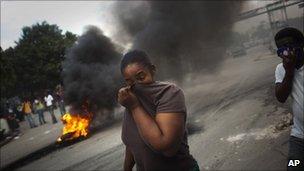UN appeals for calm after cholera riots in Haiti
- Published

Two protesters were killed on Monday, including one hit by a bullet fired by a UN peacekeeper
The UN has said attacks on relief workers battling the Haiti cholera are seriously hampering the response.
Aid flights had been cancelled, water purification and training projects curtailed, while food had been looted or burnt at a warehouse, it added.
UN troops have been blamed by some residents for bringing the disease into the country. So far, more than 1,100 people have died.
Officials in Florida have confirmed the first case of cholera in the US.
On Wednesday, state health officials said a woman had been treated after visiting relatives in Haiti.
But they said the risk of the disease spreading was "extremely low" due to better systems of sanitation in the United States.
Earlier, the Dominican Republic said it had detected its first case of cholera.
Health Minister Bautista Rojas said the patient was a Haitian migrant who had returned from his homeland to the eastern Dominican Republic.
The Dominican authorities have stepped up border controls and health checks to try to stop the disease from spreading.
'Hampering' elections
On Tuesday, the UN mission in Haiti (Minustah) appealed for an end to violent demonstrations in the cities of Cap-Haitien and Hinche, which it said had seriously hampered its response to the outbreak.
On Monday, armed demonstrators also opened fire on peacekeepers at Quartier Morin in the Nord Department, a UN statement said.
At least two protesters were killed, including one hit by a bullet fired by a peacekeeper in Quartier Morin. Six UN personnel were injured in Hinche.
The UN said it was forced to cancel flights carrying soap, medical supplies and personnel to the north, where the outbreak is centred.
Demonstrators also looted and burnt a World Food Programme warehouse, destroying 500 tonnes of food aid, and other humanitarian organisations in the area had suspended projects, it added.
The violent demonstrations broke out after some people started blaming UN peacekeepers from Nepal - where cholera is endemic - for introducing the disease, which officials said had killed 1,110 people and infected more than 17,000 others as of Monday.
The UN said tests at the base used by the peacekeepers had all proved negative, and that the violence was instead intended to disrupt presidential elections scheduled for 28 November.
On Wednesday, the Deputy Spokesperson for the United Nations Stabilisation Mission in Haiti, Vincenzo Pugliese, told the BBC the situation remained very tense in Cap-Haitien.
He said many businesses had not opened, and many people had kept their children away from school.
But he said the UN had sent reinforcements to the area.
Mr Pugliese suggested the violence there had been provoked by political forces "that do not want elections to happen".
He said targeting UN forces, which are providing logistical support for the forthcoming poll, was "a clear way of hampering the electoral process".
The BBC's international development correspondent, Mark Doyle, says the UN force is unpopular because it is widely seen as the public face of the Haitian government.
Facilities 'overrun'
Haiti's President, Rene Preval, also appealed for calm on Tuesday, saying the demonstrations were keeping people from getting treatment.
"Disorder and instability have never brought solutions to a country going through hard times," he said in a national address. "You must be even more watchful of those who exploit the country's misfortunes for their own benefit."
"Gunshots, throwing bottles, barricades of burning tires will not help us eradicate cholera bacteria. On the contrary, it will prevent the sick from receiving care and to deliver medicine where it is needed."
The aid group, Medecins Sans Frontieres (MSF) has warned that its facilities are already overrun and that it will not have the capacity to treat the growing numbers of patients in the coming days.
Cholera is caused by bacteria transmitted through contaminated water or food. It causes diarrhoea and vomiting leading to severe dehydration, and can kill quickly if not treated through rehydration and antibiotics.
The Caribbean country is still reeling from January's earthquake, which killed an estimated 200,000 people and displaced about 1.3 million.
- Published10 November 2010
- Published23 November 2010